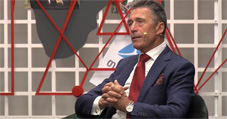
Tbilisi hosts two-day international political conference
By Tsotne Pataraia
Thursday, September 12
The McCain Institute and the Economic Policy Research Center (EPRC) on Sep. 9-10 for the fifth year jointly hosted international political discussions at the Hotel Rooms in Tbilisi, Georgia. The 5th Tbilisi International Conference started on September 9 under the title “Now What”.
The conference featured sessions on the future of Georgian democracy, NATO/EU, the Baltics, Ukraine, Turkey, Russia, state capture, Brexit, and U.S. foreign policy. Among the guests at the Tbilisi International Conference were former NATO Secretary-General Anders Fogh Rasmussen, Foreign Minister of Lithuania Lina Linkevicus, Slovak Foreign Minister Miroslav Lajcak, Acting Assistant Secretary of State for European and Eurasian Affairs Philip Riker, former Latvian President Valdis Zatlers, former commanding general of US Armed Forces in Europe Ben Hodges, US and Western European leaders in politics and security, including US diplomat Matthew Bryza, John Tefft and representatives of the international press.
Nino Evgenidze, executive director of the Economic Policy Research Center, the main organizer of the conference referred to the event as a multifunctional platform of all kind of people interested in international relations and international security:
"The Tbilisi International Conference is full of information and opportunities. Conversations have taken place and relationships built at the conference have been translated into momentum and resolve, now needed more than ever," she stated.
Within two days, both Georgian and foreign policymakers and researchers were allowed to express their views on issues related to internal and external challenges of Georgia. Georgian politicians Parliament Speaker Archil Talakvadze, leader of European Georgia Giga Bokeria and United National Movement member Salome Samadashvili also participated in one of the panels.
Georgia’s progress towards NATO and the EU, its democratic and economic issues and Russia were at the top of the agenda of the conference. Discussing the issues, US Deputy Assistant Secretary of State Philip Ricker expressed support towards Georgia's territorial integrity and concerns about the deployment of Russian troops in the occupied territories along with some problems regarding strengthening Georgian democracy:
“We want this partnership to grow further. We will work together as friends, partners and ultimately as allies. We want Georgia to take these steps. That is why, as friends and partners, we are very sincere when talking about problems, recommendations, resources and ideas on how to strengthen your democracy,” Philip Riker said.
When talking about domestic problems, OSCE Chairperson-in-Office, Minister of Foreign and European Affairs of the Republic, Miroslav Lajcak focused on the implementation of OSCE recommendations. The main recommendation of the organization was a comprehensive review of electoral legislation following the Georgian presidential election: “The OSCE not only monitors but also assists countries in holding elections. The main recommendation after the Presidential elections was a comprehensive review of electoral legislation. According to the observation report, the elections were free, competitive, there were few problems, there were no questions about the legitimacy of the election process. However, it would be really good to review the electoral legislation in a complex way. I know that the country has started a discussion on this issue. I would advise Georgian authorities to apply the recommendations of the observation missions,” Lajcak said.
The real highlight of the event was the one-on-one interview with former Secretary-General of NATO Anders Fogh Rasmussen. Former Secretary-General of NATO touched upon the issue of Georgian occupied territories Abkhazia and South Ossetia and the problem it rises with the 5th article of NATO’S Regulation (“according to Article 5 if a NATO Ally is the victim of an armed attack, every other member of the Alliance will consider this act of violence as an armed attack against all members and will take the actions it deems necessary to assist the Ally attacked “):
“It is obvious that the unresolved conflict about the border of Abkhazia and South Ossetia with Russia is a big issue. So this question follows the subject: how can this problem be solved? I believe that this issue should be discussed within the borders of Georgia. Would you accept the mechanism that would ensure the 5th Article of NATO’S Regulation be carried out only on the territorial parts of Georgia that the country controls? We should also answer this question in NATO,” Rasmussen stated.
The conference did not go without excesses. Irma Inashvili, Deputy Chairperson at the Parliament of Georgia and representative of the party “Patriots of Georgia” interrupted a panel composed of human rights activists and diplomats, titled “Where is Russia Going?”, where issues of violation of human rights and international law by Russia, with a special focus on Georgia, was supposed to be discussed. It was the first time that the Tbilisi International Conference has been interrupted by pro-Russian activists over its five-year history. Many journalists and TV channels stormed the room to record Inashvili’s declaration but were escorted back shortly after.
The Tbilisi International Conference builds on its reputation as a must-attend event for leaders across Georgia, the United States, and Europe. Each September the conference brings together top international leaders, experts, and policymakers – with a view toward keeping Georgia high on the transatlantic agenda and keeping the region front of mind for democratic progress and economic opportunity. Welcoming high-ranked politicians and diplomats, representatives of NGOs and the business community from the US, Europe, and Georgia, the conference is a major political event for Georgia.


